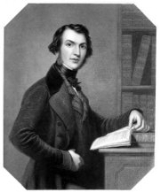
statesman
. In a career lasting over sixty years, he served as Prime Minister
four separate times (1868–1874, 1880–1885, February–July 1886 and 1892–1894), more than any other person. Gladstone was also Britain's oldest Prime Minister, 84 years old when he resigned for the last time. He had also served as Chancellor of the Exchequer
four times (1853–1855, 1859–1866, 1873–1874, and 1880–1882).
Gladstone first entered Parliament in 1832.
Decision by majorities is as much an expedient as lighting by gas.![]()
Economy is the first and great article (economy such as I understand it) in my financial creed. The controversy between direct and indirect taxation holds a minor, thought important place.![]()
I am certain, from experience, of the immense advantage of strict account-keeping in early life. It is just like learning the grammar then, which when once learned need not be referred to afterwards.![]()
We may be for or against the South. But there is no doubt that Jefferson Davis|Jefferson Davis and other leaders of the South have made an Army; they are making, it appears, a Navy; and they have made — what is more than either — they have made a Nation.... We may anticipate with certainty the success of the Southern States so far as regards their separation from the North.![]()
But how is the spirit of expenditure to be exorcised? Not by preaching; I doubt if even by yours. I seriously doubt whether it will ever give place to the old spirit of economy, as long as we have the income-tax. There, or hard by, lie questions of deep practical moment.![]()
I venture to say that every man who is not presumably incapacitated by some consideration of personal unfitness or of political danger is morally entitled to come within the pale of the Constitution.![]()
At last, my friends, I am come amongst you. And I am come...'unmuzzled'.![]()
I am inclined to say that the personal attendance and intervention of women in election proceedings, even apart from any suspicion of the wider objects of many of the promoters of the present movement, would be a practical evil not only of the gravest, but even of an intolerable character.![]()

